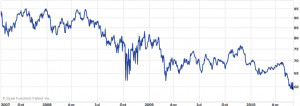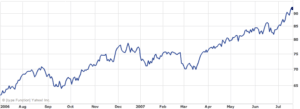This Sunday, the Carnival of Wealth returns to these parts. Are you ready? Submit your entry here if you’re a blogger. Deadline fast approaching. And if you’re not a blogger, congratulations on being one of those people who’s confident enough not to feel the need to share your opinions with the universe. Either way, come back Sunday when we showcase the good, the passable and the mediocre in recent personal finance posts.
Archives for March 2011
Yakezie Carnival
Without further ado, and with great fanfare (alright, maybe there’s slightly more ado), Control Your Cash is proud to host the Yakezie Carnival for the first time. Apparently Yakezie management saw what we’ve done with previous carnivals yet wasn’t thwarted. Thanks to the esteemed Sam at Yakezie for letting us host, and again, these are actual submissions from actual Yakezie members:
Julie Mayfield at The Family CEO Blog recently discovered Groupon (you know, the folks who were offered $6 billion for their startup and let the opportunity slip away) – only Julie found an inventive way to take even greater advantage of Groupon’s extraordinary deals.
Speaking of deals, Glen Craig at Parenting Family Money introduces us to something called Amazon Mom. If you’ve managed to successfully lie on your back and reproduce – or are caring for the loinfruit of someone who has – Amazon has found a way for you to buy diapers, wipes, and other disgusting items without even thinking about it.
Jacob A. Irwin at My Personal Finance Journey laments something that we here at Control Your Cash can certainly get behind – people who have no concept of taking responsibility for their own actions. But hey, if you don’t read it, it’s probably someone else’s fault.
Now here’s a comment we can sink our teeth into – Don at Money Reasons explains how paying off your mortgage is like getting income from a second job. A second job that doesn’t require you to kiss up to a boss, stay late or come in on weekends.
We’re not even close to done. Last week’s host, Dr. Dean at The Millionaire Nurse Blog, reminds us that if you think your government has an interest in you saving and spending wisely and conservatively, well, you’re living in the wrong country.
Looking to drive 85 miles or so at a stretch, never carry any cargo, and only be able to access your vehicle at certain times? If you’re tired of the always-on convenience of a gasoline-powered internal combustion engine and the ability to travel long distances, check out the best hybrid vehicles at Sustainable Personal Finance. They come complete with government incentives, because state-of-the-art products traditionally have trouble making it in the marketplace without artificial market stimulation.
Crystal at Budgeting In the Fun Stuff has tax tips for big savings this week. Have you found all your deductions and credits? No? Then read and reread this post.
Familiar with silver pairs trading? How about gold pairs? Dan P at ETF Base has a comprehensive, well-researched post that isn’t for the neophyte, but could pay handsome dividends to those willing to take the time.
Penny Saver at The Saved Quarter claims you can buy gift cards for less than face value. Really? Really. See her detailed explanation here.
If you don’t regularly read Len Penzo, you’re missing something. Actually, you’re missing lots. This week the indefatigable Mr. Penzo pours water on the ridiculous practice of paying attention to which gas stations in your area charge the least. Because when the neighborhood station charges $3.459 a gallon and the one across town charges $3.429, you’d need to have a 1,000-gallon tank or so to save enough for the cheaper station to be worth your while.
If you’re 19 years old and reading this, TIME IS RUNNING OUT. Seriously. David Mateer at Money in the 20s reminds you that it’s never too early to start investing – and as his blog’s title indicates, your 20s are as good a time as any. What you’re lacking in earning power at that age, you’re more than making up for by being able to exploit the magic of compound interest.
Then, once you’ve earned enough money from your investments, you can spend $495 of it for the privilege of spending your own money with the VISA black card. Free From Broke points out the costs and benefits of using VISA’s answer to the American Express Centurion card. If you really, really like eating peanuts in airport lounges, the black card might be for you.
Another company that takes a cut for doing absolutely nothing of value is Coinstar. Justin Weinger at Money Is The Root used to gladly pay Coinstar’s 9.8% “convenience” fee, then got religion. Folks, and by folks we mean ladies, instead of letting your coin collection grow to the point where it can’t fit in a Sparkletts 5-gallon bottle, use those coins for their intended purpose.
Kay Lynn Akers at Bucksome Boomer was minding her own business one day when her friends started getting poorly spelled solicitations for money from “her”. Yes, she got hacked. Find out how to avoid that unpleasantness with some handy tips (also, don’t use “123456” for a password. Criminals are craftier than you think.)
Penultimately, Krant Cents reminds you that retirement probably isn’t going to take care of itself. Run the numbers now instead of living under a bridge later.
And last but not least, here’s one of our own, now on its 3rd recycle, reminding you that relying on charts to invest in the stock market is a sucker’s game.
Next week, Jason at Live Real Now hosts the carnival. Thanks again for coming.
A fundamentally sound, good old-fashioned chest past of a post
Is it Recycle Friday already? Pretty soon we’re going to have to start creating new Friday content. In the meantime, this post that originally appeared on My Journey to Millions will have to tie you over. Tide you over? One or the other. Maybe later on we can home in on the right word. Or hone in on it.
Either way, today’s post explains why companies like E*Trade and their heat zone mapping or whatever the hell they call it for selecting stocks are doing more harm than good.
There are two major ways to evaluate stocks: fundamental analysis and technical analysis.
Groan. Stop whining. This isn’t difficult.
Fundamental analysis means assessing a company’s financial statements: taking the accountants’ work and reaching conclusions with it.
Technical analysis is the financial equivalent of astrology. It involves looking at how a company’s stock is performing – not how the company itself is performing – and using that to figure out what the stock will do.
Here’s an example of why that’s insane. This is what ExxonMobil stock did from July 3, 2006 to July 20, 2007:
If you remember, public sentiment at the time ran something like:
The oil companies are bleeding us dry!
They’re fixing prices!
They’re in cahoots with the Bush Administration, the Elders of Zion, the Illuminati and the Trilateral Commission!
What could possibly be a better investment for the short term than a monopolistic, chronic polluter with powerful connections and a product we can’t live without? Any room for me on that gravy train?
Here’s what ExxonMobil has done since then:

The scale on the y-axis changed, but not by much. What happened?
Centrifugal force happened. Public perception brought the stock up to a level it couldn’t sustain. Then reality set in and the stock got too expensive to attract new investors. In July of 2007, a technical analyst would have measured the angle of ExxonMobil’s rise and expected it to continue its northward progress. That same technical analyst wouldn’t reply to your emails today, assuming you could find him.
Most people who offer stock tips advocate some form of technical analysis. Why? Because it’s easy. It takes .12 seconds to comprehend a chart.
You’ve heard the disclosure phrase “past performance is not necessarily indicative of future results.” Aside from the inelegant use of the passive voice, the statement makes a lot of sense. When a stock picker uses it to keep things all nice and legal, you have to make a couple of logical connections to deduce the message, which is:
That technical “analysis” we sell? This statement renders it invalid.
Everything is cyclical to some extent, right? No stock consistently outperforms the market, because the numbers don’t allow for it. There’s a ceiling, and it’s lower than you think. If the stock of a company with a market capitalization of $20 million were to double every year, within less than a generation it’d outpace the nation’s gross domestic product.
Fundamental analysis means perusing the unglamorous, dry columns of numbers that accompany corporations’ annual reports. It means going through a few years of data and comparing last year’s net revenue numbers to the previous year’s. Determining whether a company’s net profits increased, or if there’s a good reason why they decreased.
“Picking” a stock in the conventional sense – i.e., figuring out which one is going to suddenly jump in value – is a bigger scam than keno. The established stocks – the Dow components, the companies with the largest revenue and profit numbers – are traditionally the stocks with the strongest likelihood of maintaining their value. But because they’re so big, it’s impossible for them to grow that much more. Any company on this list will probably halve in size before it doubles. For a sports analogy (ladies, I’ll make this as easy as possible), Gordon Beckham (.203) is far more likely to raise his batting average by 50 points than Ichiro Suzuki (.358) is. Market conditions prevent the frontrunners from gaining any significant value. It’s the laggards who make the biggest gains.
And suffer the biggest losses.
Continuing with the analogy, Ichiro’s batting average can afford to move 50 points in the other direction. But if Beckham’s does, he’ll be on either the bench or a bus to Charlotte in short order.
This is another place where we see how badly humanity assesses risk. It’s easy to look at the potential for profit, less so to even acknowledge the possibility of loss. From Gilbert & Sullivan’s Utopia, Limited, the librettist suggests that if you’re going to create a company, begin with a trivial market capitalization. Say, 18p:
You can’t embark on trading too tremendous.
It’s strictly fair, and based on common sense.
If you succeed, your profits are stupendous,
And if you fail, pop goes your 18 pence.
A sports analogy, followed by a theater analogy. There, now everything’s in balance.
What’s more likely to hit zero – a company that’s already made its way to consistency, or one that’s closer to being 18 pence away from “popping”?
Of course there’s value in the occasional startup company. If you can find them with any consistency, then please, write this blog for us. You can even rename it after yourself.
And remember: the next coach who tells his team “you need to work on your technicals” will be the first.





